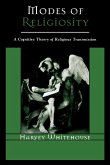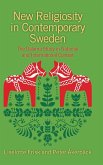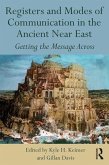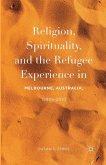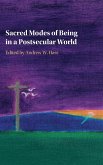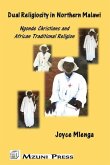- Gebundenes Buch
- Merkliste
- Auf die Merkliste
- Bewerten Bewerten
- Teilen
- Produkt teilen
- Produkterinnerung
- Produkterinnerung
Religions_whatever else they may be_are configurations of cultural information reproduced across space and time. Beginning with this seemingly obvious fact of religious transmission, Harvey Whitehouse goes on to construct a testable theory of how religions are created, passed on, and changed. At the center of his theory are two divergent 'modes of religiosity:' the imagistic and the doctrinal.
Andere Kunden interessierten sich auch für
![Modes of Religiosity Modes of Religiosity]() Harvey WhitehouseModes of Religiosity52,99 €
Harvey WhitehouseModes of Religiosity52,99 €![New Religiosity in Contemporary Sweden New Religiosity in Contemporary Sweden]() Liselotte FriskNew Religiosity in Contemporary Sweden76,99 €
Liselotte FriskNew Religiosity in Contemporary Sweden76,99 €![Registers and Modes of Communication in the Ancient Near East Registers and Modes of Communication in the Ancient Near East]() Registers and Modes of Communication in the Ancient Near East182,99 €
Registers and Modes of Communication in the Ancient Near East182,99 €![Religion, Spirituality, and the Refugee Experience in Melbourne, Australia, 1990s-2010 Religion, Spirituality, and the Refugee Experience in Melbourne, Australia, 1990s-2010]() Susan P. EnnisReligion, Spirituality, and the Refugee Experience in Melbourne, Australia, 1990s-201075,99 €
Susan P. EnnisReligion, Spirituality, and the Refugee Experience in Melbourne, Australia, 1990s-201075,99 €![Sacred Modes of Being in a Postsecular World Sacred Modes of Being in a Postsecular World]() Sacred Modes of Being in a Postsecular World90,99 €
Sacred Modes of Being in a Postsecular World90,99 €![Dual Religiosity in Northern Malawi Dual Religiosity in Northern Malawi]() Joyce MlengaDual Religiosity in Northern Malawi49,99 €
Joyce MlengaDual Religiosity in Northern Malawi49,99 €![Religiosity and Work in the Lives of Mortuary College Students Religiosity and Work in the Lives of Mortuary College Students]() Charles Lynn GibsonReligiosity and Work in the Lives of Mortuary College Students28,99 €
Charles Lynn GibsonReligiosity and Work in the Lives of Mortuary College Students28,99 €-
-
-
Religions_whatever else they may be_are configurations of cultural information reproduced across space and time. Beginning with this seemingly obvious fact of religious transmission, Harvey Whitehouse goes on to construct a testable theory of how religions are created, passed on, and changed. At the center of his theory are two divergent 'modes of religiosity:' the imagistic and the doctrinal.
Produktdetails
- Produktdetails
- Verlag: Altamira Press
- Seitenzahl: 208
- Erscheinungstermin: 19. Mai 2004
- Englisch
- Abmessung: 240mm x 161mm x 16mm
- Gewicht: 482g
- ISBN-13: 9780759106147
- ISBN-10: 0759106142
- Artikelnr.: 21632775
- Herstellerkennzeichnung
- Libri GmbH
- Europaallee 1
- 36244 Bad Hersfeld
- gpsr@libri.de
- Verlag: Altamira Press
- Seitenzahl: 208
- Erscheinungstermin: 19. Mai 2004
- Englisch
- Abmessung: 240mm x 161mm x 16mm
- Gewicht: 482g
- ISBN-13: 9780759106147
- ISBN-10: 0759106142
- Artikelnr.: 21632775
- Herstellerkennzeichnung
- Libri GmbH
- Europaallee 1
- 36244 Bad Hersfeld
- gpsr@libri.de
By Harvey Whitehouse
Part 1 Preface Part 2 Introduction Chapter 3 What is "Religion"? Chapter 4
What is "Ritual"? Chapter 5 Ritual and Religious Revelation Chapter 6
Outline of the Volume Part 7 PART ONE: COGNITION AND RELIGIOUS TRANSMISSION
Part 8 Chapter One: First Principles for Explaining Religion and Ritual
Chapter 9 Religious Traditions are Materially Constrained Chapter 10
Religious Phenomena are Selected Chapter 11 The Selection of Religious
Phenomena is Context-Dependent Chapter 12 Religious Transmission is Partly
Motivated by Explicit Religious Concepts Part 13 Chapter Two: Cognitively
Optimal Religion Chapter 14 The Naturalness of Gods Chapter 15 The
Naturalness of Ritual Chapter 16 The Naturalness of Myth Part 17 Chapter
Three: Cognitively Costly Religion Chapter 18 Cognitively Costly Gods
Chapter 19 Cognitively Costly Rituals Chapter 20 Cognitively Costly
Narratives Part 21 PART TWO: THE THEORY OF MODES OF RELIGIOSITY Part 22
Chapter Four: The Theory of Modes of Religiosity Chapter 23 Modes of
Religiosity and Memory Chapter 24 The Doctrinal Mode of Religiosity Chapter
25 The Imagistic Mode of Religiosity Chapter 26 Modes of Religiosity
Contrasted Chapter 27 Modes of Religiosity in the Real World Chapter 28 The
Origins of Modes of Religiosity Part 29 Chapter Five: Ritual and Meaning in
the Doctrinal Mode Chapter 30 The Distinction Between Implicit and Explicit
Memory Chapter 31 The Theory of Representational Redescription Chapter 32
Representational Redescription and Routinized Ritual Chapter 33 Routinized
Ritual and Exegesis Chapter 34 Routinization, Relevance, and Revelation
Part 35 Chapter Six: Ritual and Meaning in the Imagistic Mode Chapter 36
Emotion and Episodic Memory Chapter 37 Episodic Memory and Ritual Chapter
38 Episodic Memory and Spontaneous Exegetical Reflection Chapter 39
Representational Redescription and the Imagistic Mode Part 40 Chapter
Seven: Religious Enthusiasm and Its Limits Chapter 41 Religious Enthusiasm
Chapter 42 The Limits of Religious Enthusiasm Part 43 PART THREE:
THEORETICAL AND EMPIRICAL CHALLENGES Part 44 Chapter Eight: Theoretical
Challenges Chapter 45 The Challenges Chapter 46 Form and Frequency Chapter
47 Selectionism or Mechanistic Causation? Chapter 48 Arousal, Memory, and
Motivation Chapter 49 Procedural versus Exegetical Knowledge in the Domain
of Ritual Chapter 50 Historical Transformations Part 51 Chapter Nine:
Testing the Theory Chapter 52 Predictions Chapter 53 Evidence Needed from
Ethnography, Historiography, and Archaeology Chapter 54 Evidence Needed
from the Cognitive Sciences Chapter 55 Epilogue: Theory, Description, and
the Cognitive Science of Religion Chapter 56 References Chapter 57 Index
Chapter 58 About the Author
What is "Ritual"? Chapter 5 Ritual and Religious Revelation Chapter 6
Outline of the Volume Part 7 PART ONE: COGNITION AND RELIGIOUS TRANSMISSION
Part 8 Chapter One: First Principles for Explaining Religion and Ritual
Chapter 9 Religious Traditions are Materially Constrained Chapter 10
Religious Phenomena are Selected Chapter 11 The Selection of Religious
Phenomena is Context-Dependent Chapter 12 Religious Transmission is Partly
Motivated by Explicit Religious Concepts Part 13 Chapter Two: Cognitively
Optimal Religion Chapter 14 The Naturalness of Gods Chapter 15 The
Naturalness of Ritual Chapter 16 The Naturalness of Myth Part 17 Chapter
Three: Cognitively Costly Religion Chapter 18 Cognitively Costly Gods
Chapter 19 Cognitively Costly Rituals Chapter 20 Cognitively Costly
Narratives Part 21 PART TWO: THE THEORY OF MODES OF RELIGIOSITY Part 22
Chapter Four: The Theory of Modes of Religiosity Chapter 23 Modes of
Religiosity and Memory Chapter 24 The Doctrinal Mode of Religiosity Chapter
25 The Imagistic Mode of Religiosity Chapter 26 Modes of Religiosity
Contrasted Chapter 27 Modes of Religiosity in the Real World Chapter 28 The
Origins of Modes of Religiosity Part 29 Chapter Five: Ritual and Meaning in
the Doctrinal Mode Chapter 30 The Distinction Between Implicit and Explicit
Memory Chapter 31 The Theory of Representational Redescription Chapter 32
Representational Redescription and Routinized Ritual Chapter 33 Routinized
Ritual and Exegesis Chapter 34 Routinization, Relevance, and Revelation
Part 35 Chapter Six: Ritual and Meaning in the Imagistic Mode Chapter 36
Emotion and Episodic Memory Chapter 37 Episodic Memory and Ritual Chapter
38 Episodic Memory and Spontaneous Exegetical Reflection Chapter 39
Representational Redescription and the Imagistic Mode Part 40 Chapter
Seven: Religious Enthusiasm and Its Limits Chapter 41 Religious Enthusiasm
Chapter 42 The Limits of Religious Enthusiasm Part 43 PART THREE:
THEORETICAL AND EMPIRICAL CHALLENGES Part 44 Chapter Eight: Theoretical
Challenges Chapter 45 The Challenges Chapter 46 Form and Frequency Chapter
47 Selectionism or Mechanistic Causation? Chapter 48 Arousal, Memory, and
Motivation Chapter 49 Procedural versus Exegetical Knowledge in the Domain
of Ritual Chapter 50 Historical Transformations Part 51 Chapter Nine:
Testing the Theory Chapter 52 Predictions Chapter 53 Evidence Needed from
Ethnography, Historiography, and Archaeology Chapter 54 Evidence Needed
from the Cognitive Sciences Chapter 55 Epilogue: Theory, Description, and
the Cognitive Science of Religion Chapter 56 References Chapter 57 Index
Chapter 58 About the Author
Part 1 Preface Part 2 Introduction Chapter 3 What is "Religion"? Chapter 4
What is "Ritual"? Chapter 5 Ritual and Religious Revelation Chapter 6
Outline of the Volume Part 7 PART ONE: COGNITION AND RELIGIOUS TRANSMISSION
Part 8 Chapter One: First Principles for Explaining Religion and Ritual
Chapter 9 Religious Traditions are Materially Constrained Chapter 10
Religious Phenomena are Selected Chapter 11 The Selection of Religious
Phenomena is Context-Dependent Chapter 12 Religious Transmission is Partly
Motivated by Explicit Religious Concepts Part 13 Chapter Two: Cognitively
Optimal Religion Chapter 14 The Naturalness of Gods Chapter 15 The
Naturalness of Ritual Chapter 16 The Naturalness of Myth Part 17 Chapter
Three: Cognitively Costly Religion Chapter 18 Cognitively Costly Gods
Chapter 19 Cognitively Costly Rituals Chapter 20 Cognitively Costly
Narratives Part 21 PART TWO: THE THEORY OF MODES OF RELIGIOSITY Part 22
Chapter Four: The Theory of Modes of Religiosity Chapter 23 Modes of
Religiosity and Memory Chapter 24 The Doctrinal Mode of Religiosity Chapter
25 The Imagistic Mode of Religiosity Chapter 26 Modes of Religiosity
Contrasted Chapter 27 Modes of Religiosity in the Real World Chapter 28 The
Origins of Modes of Religiosity Part 29 Chapter Five: Ritual and Meaning in
the Doctrinal Mode Chapter 30 The Distinction Between Implicit and Explicit
Memory Chapter 31 The Theory of Representational Redescription Chapter 32
Representational Redescription and Routinized Ritual Chapter 33 Routinized
Ritual and Exegesis Chapter 34 Routinization, Relevance, and Revelation
Part 35 Chapter Six: Ritual and Meaning in the Imagistic Mode Chapter 36
Emotion and Episodic Memory Chapter 37 Episodic Memory and Ritual Chapter
38 Episodic Memory and Spontaneous Exegetical Reflection Chapter 39
Representational Redescription and the Imagistic Mode Part 40 Chapter
Seven: Religious Enthusiasm and Its Limits Chapter 41 Religious Enthusiasm
Chapter 42 The Limits of Religious Enthusiasm Part 43 PART THREE:
THEORETICAL AND EMPIRICAL CHALLENGES Part 44 Chapter Eight: Theoretical
Challenges Chapter 45 The Challenges Chapter 46 Form and Frequency Chapter
47 Selectionism or Mechanistic Causation? Chapter 48 Arousal, Memory, and
Motivation Chapter 49 Procedural versus Exegetical Knowledge in the Domain
of Ritual Chapter 50 Historical Transformations Part 51 Chapter Nine:
Testing the Theory Chapter 52 Predictions Chapter 53 Evidence Needed from
Ethnography, Historiography, and Archaeology Chapter 54 Evidence Needed
from the Cognitive Sciences Chapter 55 Epilogue: Theory, Description, and
the Cognitive Science of Religion Chapter 56 References Chapter 57 Index
Chapter 58 About the Author
What is "Ritual"? Chapter 5 Ritual and Religious Revelation Chapter 6
Outline of the Volume Part 7 PART ONE: COGNITION AND RELIGIOUS TRANSMISSION
Part 8 Chapter One: First Principles for Explaining Religion and Ritual
Chapter 9 Religious Traditions are Materially Constrained Chapter 10
Religious Phenomena are Selected Chapter 11 The Selection of Religious
Phenomena is Context-Dependent Chapter 12 Religious Transmission is Partly
Motivated by Explicit Religious Concepts Part 13 Chapter Two: Cognitively
Optimal Religion Chapter 14 The Naturalness of Gods Chapter 15 The
Naturalness of Ritual Chapter 16 The Naturalness of Myth Part 17 Chapter
Three: Cognitively Costly Religion Chapter 18 Cognitively Costly Gods
Chapter 19 Cognitively Costly Rituals Chapter 20 Cognitively Costly
Narratives Part 21 PART TWO: THE THEORY OF MODES OF RELIGIOSITY Part 22
Chapter Four: The Theory of Modes of Religiosity Chapter 23 Modes of
Religiosity and Memory Chapter 24 The Doctrinal Mode of Religiosity Chapter
25 The Imagistic Mode of Religiosity Chapter 26 Modes of Religiosity
Contrasted Chapter 27 Modes of Religiosity in the Real World Chapter 28 The
Origins of Modes of Religiosity Part 29 Chapter Five: Ritual and Meaning in
the Doctrinal Mode Chapter 30 The Distinction Between Implicit and Explicit
Memory Chapter 31 The Theory of Representational Redescription Chapter 32
Representational Redescription and Routinized Ritual Chapter 33 Routinized
Ritual and Exegesis Chapter 34 Routinization, Relevance, and Revelation
Part 35 Chapter Six: Ritual and Meaning in the Imagistic Mode Chapter 36
Emotion and Episodic Memory Chapter 37 Episodic Memory and Ritual Chapter
38 Episodic Memory and Spontaneous Exegetical Reflection Chapter 39
Representational Redescription and the Imagistic Mode Part 40 Chapter
Seven: Religious Enthusiasm and Its Limits Chapter 41 Religious Enthusiasm
Chapter 42 The Limits of Religious Enthusiasm Part 43 PART THREE:
THEORETICAL AND EMPIRICAL CHALLENGES Part 44 Chapter Eight: Theoretical
Challenges Chapter 45 The Challenges Chapter 46 Form and Frequency Chapter
47 Selectionism or Mechanistic Causation? Chapter 48 Arousal, Memory, and
Motivation Chapter 49 Procedural versus Exegetical Knowledge in the Domain
of Ritual Chapter 50 Historical Transformations Part 51 Chapter Nine:
Testing the Theory Chapter 52 Predictions Chapter 53 Evidence Needed from
Ethnography, Historiography, and Archaeology Chapter 54 Evidence Needed
from the Cognitive Sciences Chapter 55 Epilogue: Theory, Description, and
the Cognitive Science of Religion Chapter 56 References Chapter 57 Index
Chapter 58 About the Author



